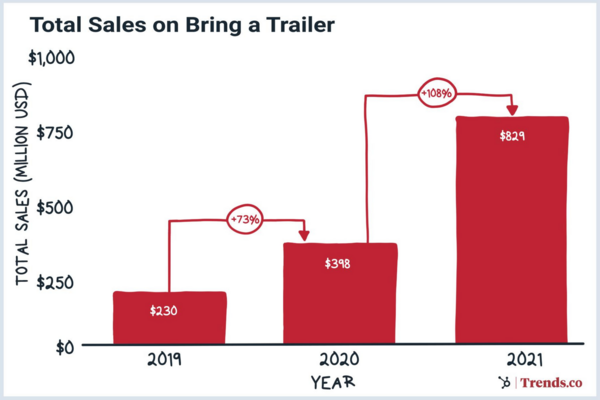My mid-week morning train WFH reads:
• Who Holds the Student Loan Debt? Most individuals see a return on their student loans in the form of a higher paying career. (Of Dollars And Data) see also Debt Babies: Make repayment of all student loans (assumed to the current year only) 100% tax deductible, and retroactively — at least in some part — for people who already paid. Remove all legal barriers to discharging student loan debt in bankruptcy. Abolish the institution of federal student loans. (Pirate Wires)
• For job searchers, $20 per hour is the new $15. It’s a sign of how inflation and a labor shortage pushed up wages faster than anyone could’ve imagined a decade ago, when Fight for $15, a union-led push to organize fast-food workers, was founded. (Axios)
• Buyers Are on the Sidelines: Desirable homes at the right price are still flying off the shelves, but we’re starting to see some evidence of normalization in the housing market. Median days on market are still absurdly low, but it’s heading in the right direction. (Irrelevant Investor)
• Car Companies Are Making a Deadly Mistake With Electric Vehicles : The heft of electric vehicles is not their only safety risk. Even with heavy batteries, these vehicles’ electric powertrains allow them to accelerate unusually quickly. Chevrolet touts its “Wide Open Watts Mode” that allows the Chevy Blazer EV, an SUV, to accelerate from zero to 60 in under four seconds—a speed that is comparable to popular muscle cars like the Dodge Charger and Ford Mustang. A Tesla Model X Plaid reached 60 mph in 2.5 seconds—faster than any other SUV. (Slate)
• Shakeups at Carlyle, Apollo Underscore Need for Succession Planning: There may be more scrutiny of publicly traded private equity firms in the current investment landscape. (CIO)
• Pretty Safe Lies: “But is it safe?” Good economists will scoff that it’s a meaningless question, because safety is always a matter of degree. Nothing in the real world is perfectly safe. Even if you spend your day hiding in your house, you could die of a heart attack, an earthquake, or a home invasion. (Bet On It)
• The Crypto World Can’t Wait for ‘the Merge’ A long-awaited upgrade to Ethereum, the most popular crypto platform, may make the technology more environmentally sustainable. But it comes with risks. (New York Times)
• You Love iPhone. Your Partner Loves Android. Here’s How to Make It Work. The pros and cons of Apple and Google’s mobile operating systems—and how people can find neutral apps that work with both. (Wall Street Journal)
• What Drives Galaxies? The Milky Way’s Black Hole May Be the Key. Supermassive black holes have come to the fore as engines of galactic evolution, but new observations of the Milky Way and its central hole don’t yet hang together. (Quanta Magazine)
• Serena Williams by the Numbers: Her 319 Opponents Tell the Stories of Entire Eras An analysis of every Williams head-to-head matchup shows top-class rivals rising, falling, and almost always losing to the 23-time major champion. (Wall Street Journal) see also John McEnroe, Seriously On the eve of the U.S. Open, a conversation with the famously stormy NYC tennis legend, the subject of a new Showtime documentary. (Wall Street Journal)
Be sure to check out our Masters in Business next week with Eric Balchunas, Senior ETF Analyst for Bloomberg, where he is co-creator of the Bloomberg podcast Trillions, and co-host of Bloomberg TV’s ETF IQ. He has authored several books, most recently “The Bogle Effect: How John Bogle and Vanguard Turned Wall Street Inside Out and Saved Investors Trillions.”
Online auctions have exploded since Covid

Source: Trends
Sign up for our reads-only mailing list here.

